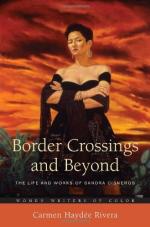|
This section contains 5,319 words (approx. 18 pages at 300 words per page) |

|
SOURCE: Busch, Juan Daniel. “Self-Baptizing the Wicked Esperanza: Chicana Feminism and Cultural Contact in The House on Mango Street.” Mester 22-23, nos. 1-2 (fall-spring 1993-1994): 123-34.
In the following essay, Busch contends that The House on Mango Street represents the protagonist's development of Chicana feminist empowerment and a fluid and progressive notion of Chicana identity.
A counterstance locks one into a duel of oppressor and oppressed; locked in mortal combat, like the cop and the criminal, both are reduced to a common denominator of violence. The counterstance refutes the dominant culture's views and beliefs, and, for this, it is proudly defiant. All reaction is limited by, and dependent on, what it is reacting against. Because the counterstance stems from a problem with authority—outer as well as inner—it's a step towards liberation from cultural domination. But it is not a way of life. At some point, on...
|
This section contains 5,319 words (approx. 18 pages at 300 words per page) |

|


